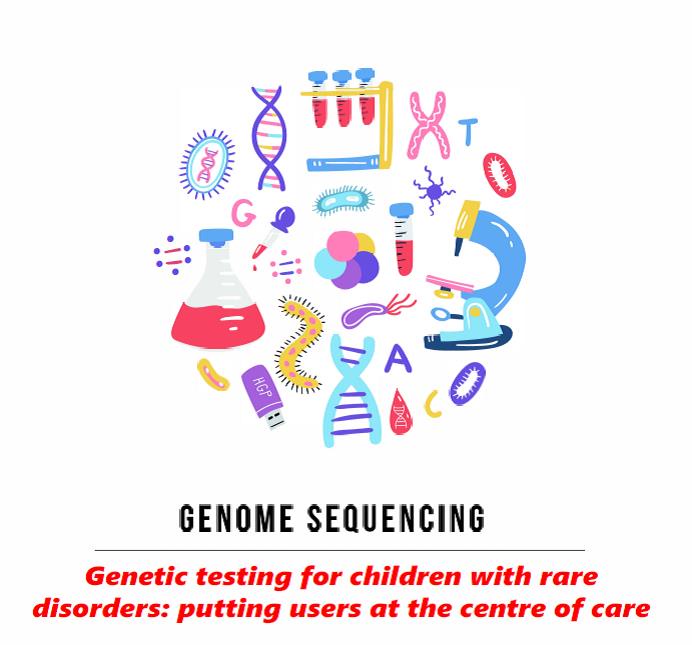Around 6,000 children are born in the UK each year with a Syndrome Without a Name (SWAN). A SWAN is a genetic condition so rare that it is very difficult to diagnose. SWANs are often severe and life threatening. They have a huge impact upon quality of life and wellbeing for the child and their family.
Children with a ‘SWAN’ typically have many hospital visits and invasive tests in an unfulfilling search for a diagnosis. Few families ever receive one. When they do, it is sometimes wrong. Without a diagnosis it is difficult for families to get information and support. New types of genetic tests will give some families the chance to receive a diagnosis. By working together with the Department of Medical Genetics at the University of Aberdeen and the Scottish Genomes Partnership (SGP) we hope to understand how these new genetic tests benefit patients and their families.

New genetic tests
Most of the genetic testing in Scotland takes place in the NHS. The normal tests to diagnose rare conditions look at DNA from 1-100 genes. These tests are ordered by a doctor. Which genes are tested depends on the symptoms in the patient.
Newer gene tests are becoming available through the NHS or research studies. These new tests look at much more of a person’s DNA. We can look at all the parts that are used to make proteins, called ‘Whole Exome Sequencing’, or we can look at the entire DNA sequence, called ‘Whole Genome Sequencing’. These newer tests can mean that more people get a diagnosis, and sooner.
We want to learn about the benefits of these newer tests. This could mean less testing or less invasive tests. It could also mean faster access to information about the condition and ways to treat it.
Valuing new genetic tests
The 100,000 Genomes Project and the Deciphering Development Disorders (DDD) Study have led the way in introducing these newer tests into routine healthcare. But, so far, we don’t know much about how patients and their families value the possible benefits of these tests.
In health economics, the approach recommended to value benefits is to ask a list of questions called the EQ-5D. This measures health-related quality of life. It assumes that all benefits from healthcare can be seen (and valued) by asking only about mobility, self-care, usual activities, pain and discomfort, and anxiety and depression. But this is a very narrow definition of value. It ignores any non-health aspects of care that might be important. These might include having knowledge about your condition, the time it takes to get a diagnosis, and choice about what tests you get. We expect that these non-health aspects will be important for patients with rare conditions who need genetic tests.
A systematic review of health economic analysis of genomic studies is one way to identify where there are gaps in information. A recently published review showed that there was a clear need to adopt a user-perspective when valuing the benefits of newer gene tests.
Our research
Research at HERU, in collaboration with the Department of Medical Genetics at the University of Aberdeen and the Scottish Genomes Partnership (SGP), is addressing the information gap around the benefits to patients and families of different genetic testing pathways. We have already conducted some exploratory work with a small number of SGP participants. This suggested that EQ-5D did not measure the benefits of the test properly. It also helped us identify other ways to measure benefit. We will use the initial findings to roll out this work more widely. There’s more information at the project page on the HERU website.
We hope that our research will provide evidence to help inform future NHS genetic testing provision and, ultimately, to make a difference to the children and families affected by undiagnosed rare genetic conditions.
| There is more information on undiagnosed children at the SWAN UK website. Friday April 26th 2019 was ‘Undiagnosed Children’s Day’. The theme acknowledged the bravery of the children and families affected by unknown genetic conditions. |
For more information about this project, please contact Professor Mandy Ryan or Lynda McKenzie and be sure to follow the HERU blog and our twitter account (@HERU_Abdn).
Thanks to Professor Zofia Miedzybrodzka and Dr Lynne Mennie of the Department of Medical Genetics at the University of Aberdeen for their contribution to this blog post.
HERU is supported by the Chief Scientist Office (CSO) of the Scottish Government Health and Social Care Directorates (SGHSC). The views expressed here are those of the Unit and not necessarily those of the CSO.


